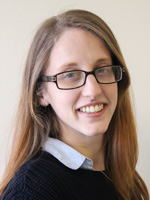Alumna Nikki Tebaldi Wins Excellence in Graduate Studies Award for Software Development, Credits Good Organization, Faculty Support for Her
 Nikki Tebaldi (MET’21)
Nikki Tebaldi (MET’21)Software Engineer, University of Massachusetts at Amherst
MS in Software Development
This interview was originally published in summer 2021. Nikki now holds the position of Cloud Adoption Engineer at the NASA Jet Propulsion Laboratory.
What do you find most fascinating about the discipline of software development? Do you have a particular focus within the broader field?
I really enjoy designing and architecting software programs. I find the process of integrating different libraries, APIs, or services into a program to meet specific requirements to be quite rewarding. Through this process, I am also able to explore new concepts and technologies and find the best fit for what I am designing. My focus in the broader field of software development is research computing. I like that it encompasses software development and systems design while supporting research goals and missions in another discipline or domain.
Did you always intend on going back to school, or did the need arise at a particular moment?
This is my second master’s degree, so I had not really anticipated going back for another one! However, while I was getting my first degree, I found that I really enjoyed software development and started building some foundational programming skills. After taking a few programming classes, I realized that I really wanted the structure a degree program could provide, and so I decided to pursue one through BU.
Congratulations on your high achievement in the Master of Science in Software Development (MSSD) program and your Award for Excellence in your studies! Looking back, what do you consider to be the main ingredients of your success?
The main ingredient for my success was scheduling and planning. In advance, I identified the work I needed to accomplish for the week and scheduled tasks for each day outside of my working hours. In this way, I was able to work incrementally towards each week’s goal and ultimately complete the coursework needed. This also allowed me to schedule in some restful time and make sure that I took breaks.
I also found it really helpful to reach out to the instructors and facilitators ahead of the course start date to make sure I was ready for the course, and to get a head start on any reading. Along those lines, I made sure to turn to the instructors and facilitators if I was struggling with any of the material.
Was your success in the program driven by a particular outcome—such as professional advancement, educational achievement, personal satisfaction, or something else?
My success was mostly driven by educational achievement and personal satisfaction. I found that I was really drawn to the software development field on an intellectual level, and I started the program because I wanted to learn more. I also felt that my career would benefit from obtaining a degree in software development, and I hoped to transition from working as a systems administrator to a software developer—which I was able to do.
Is there a particular course or project that enhanced your experience in the MSSD program?
I think that Advanced Programming Techniques (MET CS 622) and Software Designs and Patterns (MET CS 665) most enhanced my experience in the MSSD program. In Advanced Programming Techniques, Professor Eric Braude encouraged me to participate in a research project which allowed me to contribute to the development of an application that grades student assignments. I found this to be a great experience. In Software Designs and Patterns, Professor Kia Teymourian provided an excellent foundation in design patterns which I really enjoyed and use in my current position.
How do you plan to apply the skills and competencies you gained during your studies moving forward? What is next in store for you?
I plan to use the skills I gained during the program to work in research computing, developing applications that support different research missions and goals. I am currently working on a project to develop an application that integrates and orchestrates the execution of algorithms developed by members of the hydrology community in anticipation of the launch of a NASA satellite that will provide the first global survey of the Earth’s surface water. Our project has recently moved to support running in the Cloud, and I hope to use my design skills to develop a Cloud-based application that runs efficiently and supports the needs of the project.
You were recognized by faculty and peers for your hard work and dedication to the MSSD program. What “words of advice” or encouragement have served as a guiding principle, or simply inspiration, for you?
My guiding principle throughout the program was to focus on the concepts, ideas, and parts of the field that really interested me and that I really enjoyed learning about. I took each hurdle as a challenge, and for concepts that I found particularly difficult I tried to take my time (which is hard due to the seven-week course format). I also found it really helpful to define my own goals for each course.